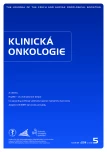What Patients Need to Know before Their Breast Cancer Surgery
Authors:
O. Coufal 1
; I. Šporcrová 2; P. Vrtělová 3
Authors‘ workplace:
Oddělení chirurgické onkologie a Klinika komplexní onkologické péče, Masarykův onkologický ústav Brno
1; Úsek klinické psychologie, Masarykův onkologický ústav Brno
2; Oddělení chirurgické onkologie, Masarykův onkologický ústav Brno
3
Published in:
Klin Onkol 2011; 24(5): 343-347
Category:
Original Articles
Overview
Backgrounds:
The quality of health care depends not only on physicians‘ medical skills but also on proper patient education. The aim of the study was to ascertain the types of information required by women before they start their breast cancer treatment.
Patients and Methods:
Before a surgery, 254 patients with early breast cancer treated primarily by surgery obtained an originally developed questionnaire containing information topics assumed to be important. The patients were asked to indicate the information they had been provided and the information they required.
Results:
The majority of patients (more than 70%) knew that their disease was malignant, that they needed the surgery and what would be the extent of the resection of their breast. Markedly less patients (47.1%) knew about the planned extent of their regional lymph nodes surgery. More than 80% patients required information about their long-term expectations, such as the overall length of cancer treatment, length and extent of their anticipated physical impairment and their chances for cure. The majority of younger women (76.2%) recommended for total mastectomy required information about breast reconstruction options. A substantial proportion of older women (about 60%) were interested to learn about an anticipated cosmetic outcome and possibilities for correction of their potential defect.
Conclusion:
Multimodal breast cancer treatment is generally managed by clinical oncologists. However, a surgeon should be enabled to discuss with the patient their cancer treatment, what it involves and how it will affect the patient’s future life. It is advisable to clarify the extent of the surgery on regional lymph nodes and to engage in discussions on cosmetic outcomes of the surgery. With respect to a proper patient education, breast cancer patients should be treated by surgeons specialized in the treatment of this disease.
Key words:
breast cancer – surgery – patient education – communication
This study was supported by the following research programme of the Ministry of Health of the Czech Republic: FUNDIN MZ0MOU2005.
The authors declare they have no potential conflicts of interest concerning drugs, products, or services used in the study.
The Editorial Board declares that the manuscript met the ICMJE “uniform requirements” for biomedical papers.
Submitted:
12. 2. 2011
Accepted:
13. 5. 2011
Sources
1. Nagler RH, Gray SW, Romantan A et al. Differences in information seeking among breast, prostate, and colorectal cancer patients: results from a population-based survey. Patient Educ Couns 2010; 81 (Suppl): S54–S62.
2. Eheman CR, Berkowitz Z, Lee J et al. Information-seeking styles among cancer patients before and after treatment by demographics and use of information sources. J Health Commun 2009; 14(5): 487–502.
3. Crane-Okada R, Wascher RA, Elashoff D et al. Longterm morbidity of sentinel node biopsy versus complete axillary dissection for unilateral breast cancer. Ann Surg Oncol 2008; 15(7): 1996–2005.
4. Aerts PD, De Vries J, Van der Steeg AF et al. The relationship between morbidity after axillary surgery and longterm quality of life in breast cancer patients: the role of anxiety. Eur J Surg Oncol 2011; 37(4): 344–349.
5. Gooiker GA, van Gijn W, Post PN et al. A systematic review and meta-analysis of the volume-outcome relationship in the surgical treatment of breast cancer. Are breast cancer patients better of with a high volume provider? Eur J Surg Oncol 2010; 36 (Suppl 1): S27–S35.
6. Chen JY, Malin J, Ganz PA et al. Variation in physicianpatient discussion of breast reconstruction. J Gen Intern Med 2009; 24(1): 99–104.
7. Mackenzie A, Patrick-Miller L, Bradbury AR. Controversies in communication of genetic risk for hereditary breast cancer. Breast J 2009; 15 (Suppl 1): S25–S32.
8. Wanchai A, Armer JM, Stewart BR. Complementary and alternative medicine use among women with breast cancer: a systematic review. Clin J Oncol Nurs 2010; 14(4): E45–E55.
Labels
Paediatric clinical oncology Surgery Clinical oncologyArticle was published in
Clinical Oncology

2011 Issue 5
- Possibilities of Using Metamizole in the Treatment of Acute Primary Headaches
- Metamizole at a Glance and in Practice – Effective Non-Opioid Analgesic for All Ages
- Metamizole vs. Tramadol in Postoperative Analgesia
- Spasmolytic Effect of Metamizole
- Safety and Tolerance of Metamizole in Postoperative Analgesia in Children
-
All articles in this issue
- Hsp90 – a Target for Anticancer Therapy
- Neoadjuvant Chemoradiotherapy of Rectal Carcinoma with Bevacizumab
- What Patients Need to Know before Their Breast Cancer Surgery
- Neuroendoscopic Biopsy of a Brain Tumor
- Adaptive IG-IMRT for Prostate Cancer
- Partial Regression of CNS Lesions of Erdheim-Chester Disease after Treatment with 2-chlorodeoxadenosine and Their Full Remission Following Treatment with Lenalidomide
- Secondary Angiosarcomas after Conservation Treatment for Breast Cancers
- Metastatic Renal Cell Carcinoma Treated with Everolimus – Data from the RENIS Clinical Registry
- Cetuximab Enhances the Anti-proliferative Effect of Trastuzumab in ERBB2 Over-expressing Breast Cancer Cells – Preliminary Study
- Clinical Oncology
- Journal archive
- Current issue
- About the journal
Most read in this issue
- Partial Regression of CNS Lesions of Erdheim-Chester Disease after Treatment with 2-chlorodeoxadenosine and Their Full Remission Following Treatment with Lenalidomide
- Neuroendoscopic Biopsy of a Brain Tumor
- Secondary Angiosarcomas after Conservation Treatment for Breast Cancers
- What Patients Need to Know before Their Breast Cancer Surgery
